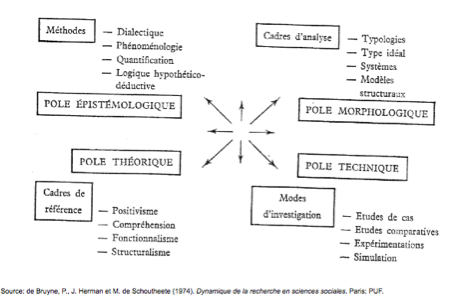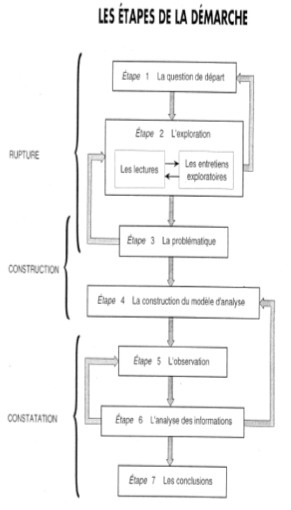Introductory course on the methods of political science
| Faculté | Faculté des sciences de la société |
|---|---|
| Département | Département de science politique et relations internationales |
| Professeur(s) | Marco Giugni[1] |
| Cours | Introduction to the methods of political science |
Lectures
Contextualisation and definitions[modifier | modifier le wikicode]
True or false?[modifier | modifier le wikicode]
- Satisfaction Level of Black Soldiers in the United States :
- Assumption: higher satisfaction when stationed at a military base in the northern United States more than in the south. The hypothesis is that the northern context, where segregation was less present, allowed black soldiers to feel better.
- Conclusion: The assumption is wrong because it presupposed an erroneous comparison.
- Religious Vote in the Kennedy Election:
- Hypothesis: The hypothesis is that the religious vote almost caused a loss of Kennedy's election. Being a Catholic, many Protestants had voted against Kennedy.
- Conclusion : however the hypothesis is invalidated, because the religious vote actually made Kennedy win. It all depends on the context.
- Find a good job:
- Hypothesis: The hypothesis is that people find good work through formal channels (advertisement, work agency, social network).
- Conclusion: One researcher proved that it is through weak ties that one finds work. These are the people we know little about. These people are in different environments with information different from that which one can receive from relatives.
Conclusion of examples: Reality is complex and often counter-intuitive.
- We need a coherent and effective theory to shed light on certain issues.
- There is a very strong link between the methodological and theoretical aspects. Theory and method are not dissociated, they are intimately linked and do not exist one without the other.
Starting questions[modifier | modifier le wikicode]
- What is the method? There are several meanings of"method".
- Why is the method important? Know how to approach data to theory.
Methodology and techniques[modifier | modifier le wikicode]
Distinction between methodology and technique[modifier | modifier le wikicode]
A distinction can be made between methodology and technique:
- Methodology: It is a reflection on the method, it is a discourse on the method, a critique of scientific research.
- Technique: specific operational procedures used by a scientific discipline to acquire and control its own empirical research results
Three levels of abstractions
- Epistemological: Everything related to the foundations of scientific knowledge. How do we know, what is knowledge? Epistemological aspect: very general reflection on how to approach knowledge, we have three levels of decreasing abstractions.
- Technical level: "the method": these are techniques, by which specific operational procedure we can acquire and control the results (this aspect will be the one we will treat). These are the procedures and instruments available for conducting research.
- Methodological: Reflection on the method, on the conditions of validity and reliability of the research; intermediate level. It is a critique of scientific research, important elements that we do not see concretely related to the basis of the method. This level is a reflection on our own part of the research.
Societal Research Environment[modifier | modifier le wikicode]
There are four aspects of self-monitoring research to determine the context in which research is conducted.
Research develops within a broader framework, it is not outside influences, there are fields of influence, constraints, fields..:
- Social demand: research responds to certain social demands. The researcher's activity is legitimized by the framework, the practice fits within the framework of a given society. There are funds and programs that fund research. Research themes are supposed to be topical themes, because policy makers need tools to make decisions.
- Axiological: it is the relationship to values, there are social and individual values that guide the research. Every researcher has his own values. The researcher must try to distance himself from the object, and not put it in the light of our own ideologies. Weber advocates an axiological neutrality.
- Doxology: refers to public opinion and more generally to common sense and non-systematic knowledge as well as the language and evidence of everyday practice. There is an opinion that is there and that influences us as researchers, as well as non-systematic knowledge. This is common sense, which sometimes in research shows itself as bad sense. According to Bourdieu, it is necessary to make an epistemological break, so the first duty of seeking is to break with common sense.
- Epistemic: influence that is given by the epistemic knowledge itself, that is, the knowledge of other researchers. This is the state of epistemological reflection and methodology as well as investigative techniques in the field under study that have an implicit influence.
There are four sources of constraints on practice.
Methodological clusters[modifier | modifier le wikicode]
The introduction to the methodology is a course of research practice, it is influenced by different elements: social demand, opinion, what has been done in the field, etc.. There are internal requirements that researchers must be aware of.
The four methodological clusters[modifier | modifier le wikicode]
- 1) Epistemological cluster: everything related to the foundations of scientific knowledge, conditions of validity of research. This pole exercises critical vigilance in research. It is the guarantor of the objectification of the scientific object, of the explanation of scientific problems. He decides the rules, the explanations of facts and criticizes these rules. This is all about the conditions of knowledge production.
Hypothetico-deductive logic is a logic of research, a way of approaching social and political reality. It is making assumptions, reflecting on what can explain areas, and through data collection proving a theory. Inductive logic is starting from the facts to go to the general.
- 2) Theoretical cluster: this pole refers to the methodology in the broad sense, we seek to characterize the approaches in which we fit. It's about contextualization, hypothesis formulation, satisfaction, finding a job, the role of religion, etc. You need a theory. There are theoretical reference frameworks that guide research (positivist, functionalism, structuralism, etc.), we will see the positivist approach and the comprehensive approach. This is the place for scientific formulation, and it is linked to the frame of reference.
- 3) Morphological cluster: there is a formal aspect to the research, which may mean that depending on the approach you choose, you are interested in the systems in various ways. These are the rules of structuring and forming the object, it imposes a certain order to the various elements. There are certain steps that will be followed. According to the perspective chosen for this structuring and more or less strict framework, there is a research requirement concerning form. For example, the difference between quantitative and qualitative approaches.
- 4) Technical cluster: it is all the methods, analyses of the data, collects data, it is the place of control of the data, which confronts them with the theory which gave rise to them. Mode of investigation". Comparative studies, etc. (the instruments I will analyze).
Beyond the external contrasts, there are internal contrasts for which these four factors must be taken into account.
This idea corresponds to a topological model of research, that is, it is not a chronological perspective mode. At any given moment, there are these four aspects. However, the weight of each pole may vary.
The previous approach is topological, not chronological, at all times there are these four requirements to consider. But there is also a more pragmatic and chronological approach to research:
The steps in the process[modifier | modifier le wikicode]
The steps of the process:
- Step 1: ask a starting question
- Step 2: exploration stage:
- reading the work of a specific field
- exploratory talks, take note of similar work
These two phases help to formulate a problem
- Step 3: problematic
- Step 4: construction of the analysis model in order to define concepts and postulate links between concepts
Critical Steps
- Step 5: observation, data collection
- Step 6: analysis of the information thanks to the information collected beforehand
- Step 7: conclusions.
Nota bene: this chronology is not unidirectional. For example, the formulation of the problem may highlight shortcomings and prompt new research to refine it.
Importance of the method[modifier | modifier le wikicode]
- translate empirically theoretical concepts: dialogue between empirical and theoretical. First there is a theory, then the field is used to test the hypothesis. However in reality there is a back and forth between theory and empirie. It is an intense process that links the abstract and general level to the concrete and specific level. Without method the link is impossible.
- characterizes and distinguishes science: the method makes it possible to distinguish science from other methods of understanding reality.
- allows us to face the complexity of social reality: we build the research object.
Sources of complexity of social reality[modifier | modifier le wikicode]
- causalité multiple : la réalité n'a pas une seule explication.
- niveaux multiples : il faut tenir compte, par exemple, de niveau individuel, contextuel qui complexifie la réalité et la tâche de la comprendre.
- relations sociales : les acteurs ne sont pas complètement indépendants, système social, il faut une méthodologie qui nous fasse ressortir l'impact de ces relations.
- réactivité : si on s'intéresse au comportement des humains, ils réagissent au processus de recherche, le fait d'interroger un individu le fait déjà réagir d’une certaine manière, il faut réfléchir de ce fait, et essayer de mettre en œuvre des manières et de contrôler les réactions, séparer le fait qui est dû à la réaction.
- erreurs de mesure : on essaie de se rapprocher de la réalité, mais il y a toujours une erreur de mesure, car on ne peut appréhender la réalité sociale complètement.
Annexes[modifier | modifier le wikicode]
- This course is largely based on Corbetta's book "Social Research : Theory, Methods and Techniques"[2]. Les deux premiers chapitres sont consultables sur Google Books
References[modifier | modifier le wikicode]
- ↑ Page personnelle de Marco Giugni sur le site de l'Université de Genève
- ↑ Corbetta, Piergiorgio 2003. Social Research: Theory, Methods and Techniques. Thousand Oaks, CA: Sage.

